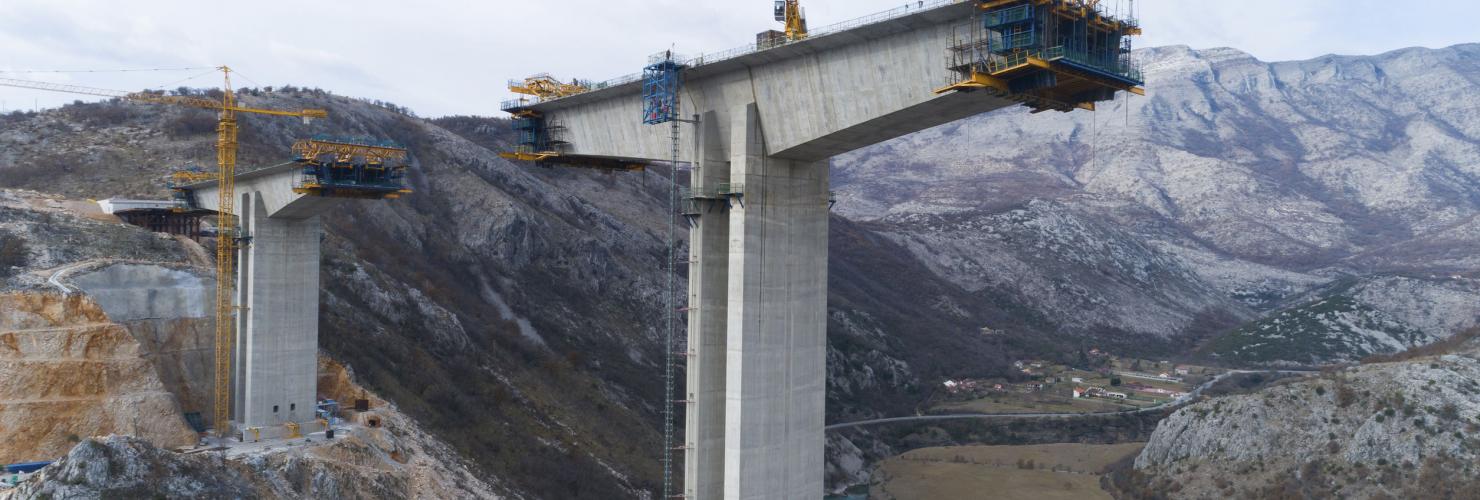
Brussels makes way for Beijing in the Balkans
In Montenegro and in the rest of the Western Balkans, the European Union is not as attractive as it used to be, and China is giving new hope to the region. Beijing offers a tempting paradigm: no-strings-attached finance and no political interference. Our author Jacob Mardell is currently travelling along China's "New Silk Road."
The European Union’s decision to postpone membership talks with Albania and North Macedonia couldn’t have been more poorly timed.
With Brussels’ commitment to the region in doubt, China’s "Belt and Road" Initiative offers an attractive alternative to countries losing hope in the endless wait to join the EU.
China used to be synonymous with cheap clothes and colorful plastic. In Montenegro today, it’s better known for sky-high cranes and gargantuan concrete pillars, as a 200-meter-tall, 1-kilometer-long bridge takes shape over the Moraca river.
The project — part of an ambitious plan to build a highway from the Adriatic coast to the border with Serbia — is led by the China Road and Bridge Corporation (CRBC), with a loan from the Exim Bank of China. This is what the Belt and Road looks like on the ground: Chinese engineering muscle coupled with cheap Chinese loans.
Little historical baggage and suitcases full of cash
In Montenegro and in the rest of the Western Balkans, China has arrived bearing little historical baggage — only suitcases full of cash. That’s in marked contrast to “the West,” which has a centuries-long tradition of interfering in local politics, and more recently — via the EU — of promising much and delivering little.
The costly construction project in Montenegro isn’t popular with everyone, but critics blame the government rather than the Chinese.
Over cups of strong coffee at a Podgorica restaurant, I ask an engineer working on the project whether he is worried about Chinese influence. He laughs, and says, “The EU already tells our politicians how to vote and what to say — with China it will be the same, just other issues.”
Montenegrins are generally pro-EU, but they are fed up. They may be more frustrated with their own politicians than with Brussels, but more broadly they are angry that nothing has changed, and that promises are going unfulfilled.
This sentiment is widespread throughout the Western Balkans. Whenever I talk to people about China, the subject of EU integration comes up sooner or later.
In North Macedonia, a local academic tells me that he’s seen the same “talking heads” from Brussels on television saying the same thing for the past five years.
Beijing is operating in a vacuum
In Bosnia and Herzegovina, I sit in the office of a local minister and listen to a rant that feels less like political theater and more like straight-up venting: “People are fed up of hoping and hoping with no results, no investment, no employment. The future is unforeseen, but the EU is not as attractive as it used to be.”
Even in Albania, which is remarkably pro-Western, a charming and soft-spoken former politician tells me, “There is frustration to be honest, there is always money but it’s not easy to access — there are no easy choices.”
It doesn’t matter whose fault it is. The bottom line is that people feel neglected, disappointed. After the breakup of Yugoslavia, there was horrific violence and economic devastation, but then there was hope. Now there is just stagnation.
Because the EU is absent in the region, Beijing is currently operating in something of a vacuum, and it offers a tempting paradigm: no-strings-attached finance that operates on the basis of mutual respect. Unlike Brussels, Beijing doesn’t demand political conditions or careful accounting. At home and internationally, Beijing prioritizes development over details like reform and human rights. In the Balkans, it is offering to build national projects the EU won’t touch: coal plants in Bosnia and Serbia, the highway in Montenegro.
At a conference on the Belt and Road Initiative hosted by Belgrade University and funded by the Chinese Embassy in Belgrade, one of the organizing academics tells me that “between Russia and Europe on either side, I see China as a third way.”
China can’t provide an alternative to EU integration
In Bosnia and Herzegovina, I walk down the banks of the Miljacka with a young translator who shows Chinese tourists around Sarajevo. We’d been talking about China, but unprompted, after a brief silence, she offers, “You know, for a long time it’s been Russia vs. the West. The West is still the West and the Balkans is still the Balkans, but China is a fresh face.”
China can’t provide an alternative to EU integration. It’s not even close to competing with inter-European trade and investment. But Beijing's presence in the region is new. China is rich. It’s optimistic about the future. It provides hope. It takes root in the gaps that Brussels has left between expectations and reality.
In North Macedonia, the government has changed the name of the entire country to placate Greece and smooth the way for eventual accession. From far away, this may seem like a small concession, but the resolution of the decades long name dispute between Greece and Macedonia is an incredibly emotive issue.
On a recent trip to the country to investigate two highways being built by Chinese company Sinohydro, I hear countless people complain about the government having taken away the country’s name. The government has committed an act of tremendous political self-harm for the sake of EU integration, and now it is being told to wait because the Bundestag has a busy summer schedule.
If, as the comments of European Commissioner for Enlargement Johannes Hahn suggest, the EU is worried about China’s influence in the European neighborhood, it should really step up its commitment to the region. Unfortunately, it appears to be doing the exact opposite.
This article was first published by Politico on June 26, 2019.

